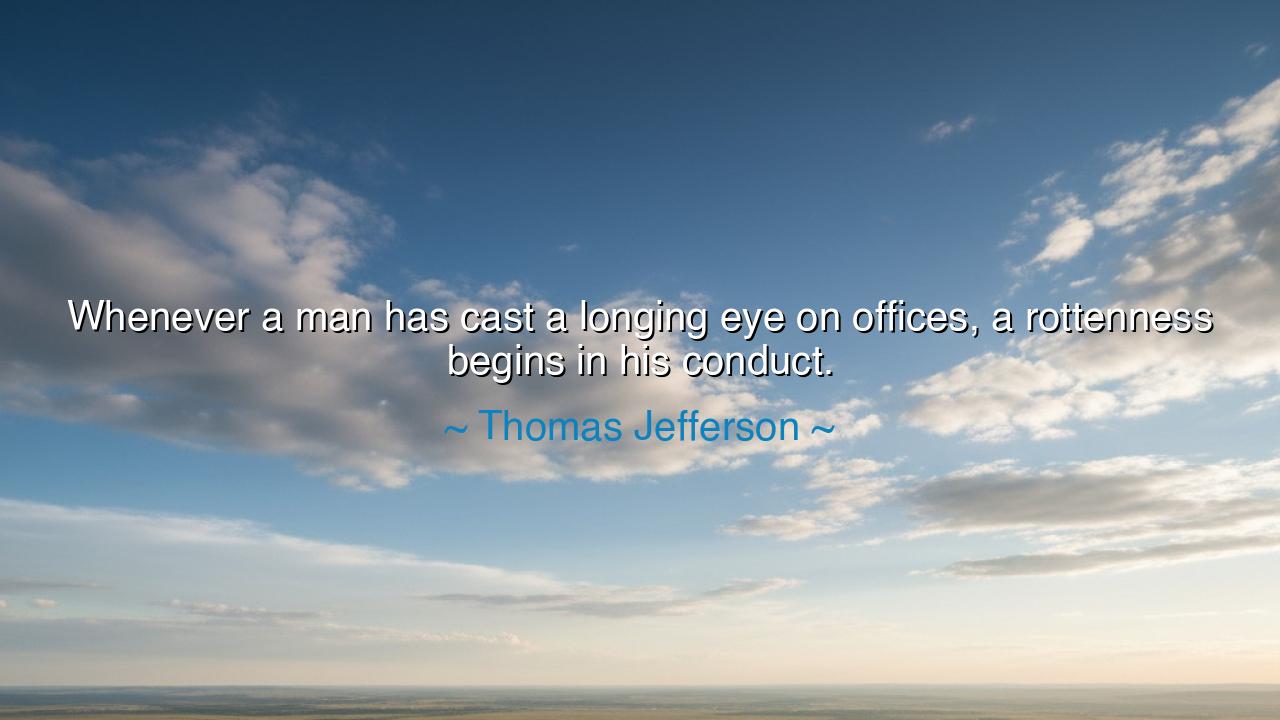
Whenever a man has cast a longing eye on offices, a rottenness






The words of Thomas Jefferson, philosopher of liberty and drafter of a nation’s charter, strike with the weight of timeless warning: “Whenever a man has cast a longing eye on offices, a rottenness begins in his conduct.” In this saying, he unmasks the corruption that comes not only from power itself, but from the desire for power. For when ambition becomes hunger, virtue decays; when one covets office for its own sake, service is forgotten, and selfishness begins to rot the soul.
The ancients spoke often of this truth. Plato declared that the best rulers are those who do not wish to rule, for ambition distorts judgment, while reluctance preserves virtue. Cincinnatus, the Roman farmer called to lead, accepted command only to return swiftly to his plow, preferring duty over glory. Such men serve the state with purity, for they do not “cast a longing eye” upon office, but bear it as a burden. Jefferson’s wisdom echoes these voices, warning that those who crave authority most fiercely are often least fit to wield it.
His words grew from the soil of young America, where the revolutionaries had fought not to enthrone new kings but to secure republican virtue. Jefferson saw the danger of politicians whose ambition made them court power rather than the common good. To him, the office was not a prize, but a trust, and to lust after it was already to betray its sacred purpose. For when power is sought for self, the rot begins, and it spreads into bribery, flattery, manipulation, and tyranny.
Consider the story of Julius Caesar, whose ambition to rule Rome destroyed the Republic. While others, like Cato and Cicero, valued principle above office, Caesar longed for the crown in all but name. That “longing eye” poisoned his conduct, turning him from general into usurper, and his rise marked the death of liberty in Rome. Jefferson, steeped in the histories of Greece and Rome, surely recalled such lessons when he penned his warning.
Let the generations remember: the true measure of a leader is not in how eagerly he seeks office, but in how faithfully he serves when called. Rottenness begins in the heart when ambition eclipses duty, and no nation can endure when its leaders see power as prize rather than trust. Jefferson’s words are not only caution but command: to guard against those who thirst for authority, and to honor those who accept it with humility. For in the republic, the greatest danger lies not in enemies abroad, but in the corruption born from ambition within.






MIMaria Isabella
I think this quote challenges us to look at the moral consequences of seeking power. It makes me wonder: is the corruption Jefferson speaks of a result of the power itself, or does it stem from a personal weakness? Can someone who genuinely wants to make a difference fall victim to the allure of office? It might be more about the individual’s ability to stay grounded, but what if the system itself pushes them toward corruption?
TVThien Van
This quote strikes me as a powerful warning against letting the desire for power cloud one’s judgment. It makes me reflect on many leaders throughout history who started with good intentions but ended up exploiting their positions. But is this inevitable? Can we truly avoid the corrupting influence of power, or are there safeguards we can put in place to ensure leaders don’t lose their integrity?
Ggg
I think Jefferson's statement offers a cautionary note about the dangers of ambition, but I’m curious if it’s always true. Couldn’t someone pursue office with integrity and still make a positive difference? Maybe the problem isn’t ambition but the structures that foster corruption. Do all people who seek office inevitably face a moral decline, or can some maintain their ethics and genuinely help others?
PHPhuong Hoa
Thomas Jefferson’s quote brings to mind the idea that power has a tendency to corrupt. But what if seeking office is not inherently bad? Perhaps the real issue is how a person handles the power once they achieve it. I wonder if ambition itself, when driven by a genuine desire to serve, can still lead to success without moral compromise. How do we reconcile the pursuit of office with maintaining ethical behavior?
VHVy Hao
I can understand the essence of this quote, but I also wonder if it's too simplistic. Does a desire for office automatically lead to corruption, or is it more about how individuals manage their ambitions? It’s possible to pursue positions of power without compromising one's morals, but the system and pressure might change that. Is it the man or the office itself that has the corrupting influence?